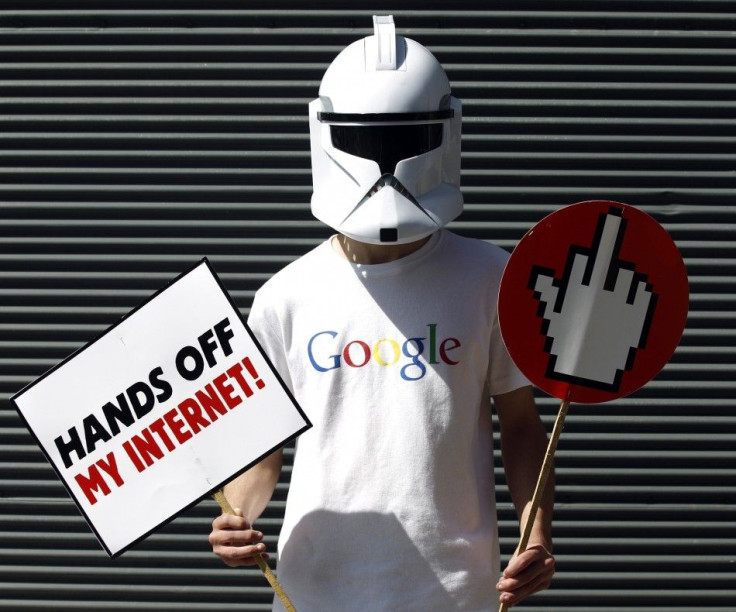NDAA Bill Aims to Suppress Internet Freedom
ANALYSIS

The National Defense Authorization Bill 2012, unanimously backed by the Senate and passed in the House of Representatives Thursday, contains some language that allows the Pentagon to effectively wage a cyberwar on any domestic enemies of the state. The bill is a serious violation of First Amendment human and civil rights, including freedom of speech and freedom of the press, and the legislation could potentially hinder the movements of both Occupy Wall Street and the Tea Party campaign, as well as quash attempts from the whistleblowers in independent news media from exposing corruption from within the government.
Here is excerpt from the bill, which the House voted upon but the Senate didn't:
Congress affirms that the Department of Defense has the capability, and upon direction by the President may conduct offensive operations in cyberspace to defend our Nation, Allies and interests, subject to (1) the policy principles and legal regimes that the Department follows for kinetic capabilities, including the law of armed conflict; and (2) the War Powers Resolution.
President Obama has yet to sign the bill, and he is expected to later this week. Lobbyists of the bill, including several leaders within the House and Senate Armed Forces Committees, said they would add language and make changes to avoid a veto.
I assured the president that we were working on additional assurances, that the concerns were not accurate, said Carl Levin, the Senate Armed Services Committee Chairman. That we'd do everything we could to make sure they wre allayed, and met.
The enormous $662 billion defense bill would mostly finance military personnel, national security programs, weapons systems and the wars in Iraq and Afghanistan, requires terrorism suspects linked to al-Qaeda be kept in military custody. The broad-reaching bill would also impose several sanctions aimed at Iran's financial structure, and would also help accelerate the transition of national protection in Afghanistan to the Afghanistan National Security Forces.
However, the Pentagon believes that non-state actors increasingly threaten to penetrate and disrupt DOD networks and systems. To address this cyber threat, the Pentagon released a plan declaring the Internet a domain of war, claiming how hostile groups are working to exploit DOD unclassified and classified networks, and some foreign intelligence organizations have already acquired the capacity to disrupt elements of DOD's information infrastructure.
The U.S. is vulnerable to sabotage in defense, power, telecommunications, banking, said Sami Saydjari, a former Pentagon cyber expert. An attack on any one of those essential infrastructures could be as damaging as any kinetic attack on U.S. soil.
If you shut down our power grid, maybe we will put a missile down one of your smokestacks, said one Pentagon official, prior to releasing its cybersecurity plan.
In other words, the Pentagon is afraid that with the Internet's capability to disseminate information instantly, the spread of information or ideas not consistent with U.S. government themes and messages could be too powerful and dangerous to national security.
Writer Kurt Nimmo sums it up:
After the NDAA is signed into law by Obama, he will have the authority to wage war against 'domestic terrorists,' defined by the Department of Homeland Security as 'rightwing extremists' and other anti-government types. As noted above, it will be the DHS that will 'direct the work' against enemies of the state. It will work with the Pentagon to militarily neutralize the threat posed by activists and the alternative media.
Since the protests began in September, Occupy protesters have been using cell phone cameras and Twitter to broadcast gross police misconduct. However, the sometimes-violent responses from police and other U.S. agencies makes it abundantly clear that government systems are in place because they want to suppress the movement, particularly its coverage.
New York cops have arrested, punched, whacked, shoved to the ground and tossed a barrier at reporters and photographers, said Michael Powell, a writer for the New York Times. Reporters with The Associated Press and The Daily News were arrested while taking notes. A radio reporter was arrested as she recorded several blocks from the park. All of this behavior 'allegedly' occurred 'on the streets of New York.'
While the Internet has been rife with hacktivism and security breaches in 2011, some politicians still maintain that it's far more dangerous to let the NDAA bill pass.
Our children deserve a world where they know the government will protect them, that it is not going to rule over them by invading their very thoughts, said representative Dennis Kucinich.
What we are talking about here is that Americans could be subjected to life imprisonment, said Sen. Al Franken (D-Minn.). Think about that for a minute. Life imprisonment. Without ever being charged, tried, or convicted of a crime. Without ever having an opportunity to prove your innocence to a judge or a jury of your peers. And without the government ever having to prove your guilt beyond a reasonable doubt. I think that denigrates the very foundations of this country.
Internet hactivist group Anonymous will battle the new bill. The group has already targeted Sen. Robert Portman (R-Ohio), who was one of the many politicians to support the bill. Sen. Portman has received $272,853 from special interest groups that support the NDAA, which has helped him purchase about $1.7 million in real estate in Ohio.
Robert J. Portman, we plan to make an example of you, said an Anonymous operative in a written statement, which also revealed a sample of Portman's personal information, including his addresses, phone numbers, and childrens' names.
If Obama signs the NDAA Bill and allows the military to take over such domestic operations, nothing will stop them from infringing on civil liberties and trashing the Constitution even further.
© Copyright IBTimes 2024. All rights reserved.





















